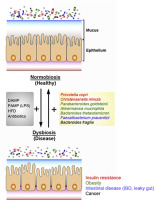当前位置:
X-MOL 学术
›
J. Food Drug Anal.
›
论文详情
Our official English website, www.x-mol.net, welcomes your
feedback! (Note: you will need to create a separate account there.)
Next generation probiotics in disease amelioration
Journal of Food and Drug Analysis ( IF 2.6 ) Pub Date : 2019-07-01 , DOI: 10.1016/j.jfda.2018.12.011 Chih-Jung Chang, Tzu-Lung Lin, Yu-Ling Tsai, Tsung-Ru Wu, Wei-Fan Lai, Chia-Chen Lu, Hsin-Chih Lai
Journal of Food and Drug Analysis ( IF 2.6 ) Pub Date : 2019-07-01 , DOI: 10.1016/j.jfda.2018.12.011 Chih-Jung Chang, Tzu-Lung Lin, Yu-Ling Tsai, Tsung-Ru Wu, Wei-Fan Lai, Chia-Chen Lu, Hsin-Chih Lai

|
Studies on the role of gut commensal bacteria in health development have rapidly attracted much more attention beyond the classical pathogens over the last decade. Many important reports have highlighted the changes in the gut microbiota (dysbiosis) are closely related to development of intra- and extra-intestinal, chronic inflammation related diseases such as colitis, obesity/metabolic syndromes, diabetes mellitus, liver diseases, cardiovascular diseases and also cancer and neurodegenerative diseases. To circumvent these difficulties, the strategy of modulating the structure of the gut microbiota has been under intensive study and shed more light on amelioration of these inflammation related diseases. While traditional probiotics generally show marginal ameliorative effects, emerging next generation probiotics start to reveal as new preventive and therapeutic tools. Recent studies have unraveled many potential next generation probiotics (NGP). These include Prevotella copri and Christensenella minuta that control insulin resistance, Parabacteroides goldsteinii, Akkermansia muciniphila and Bacteroides thetaiotaomicron that reverse obesity and insulin resistance, Faecalibacterium prausnitzii that protects mice against intestinal diseases, and Bacteroides fragilis that reduces inflammation and shows anticancer effect. New agents will soon be revealed for targeted therapy on specific inflammation related diseases. The important roles of next generation probiotics and gut microbiota normobiosis on the maintenance of intestinal integrity and homeostasis are emphasized.
中文翻译:

改善疾病的下一代益生菌
在过去十年中,关于肠道共生菌在健康发展中的作用的研究迅速引起了超越经典病原体的更多关注。许多重要报告强调了肠道微生物群的变化(生态失调)与肠内和肠外慢性炎症相关疾病的发展密切相关,例如结肠炎、肥胖/代谢综合征、糖尿病、肝病、心血管疾病等。癌症和神经退行性疾病。为了克服这些困难,调节肠道微生物群结构的策略一直在深入研究,并为改善这些炎症相关疾病提供了更多线索。虽然传统的益生菌通常显示出轻微的改善作用,新兴的下一代益生菌开始成为新的预防和治疗工具。最近的研究揭示了许多潜在的下一代益生菌 (NGP)。这些包括控制胰岛素抵抗的普雷沃氏菌和克里斯滕森氏菌,逆转肥胖和胰岛素抵抗的Parabacteroides goldsteinii、Akkermansia muciniphila和Bacteroides thetaiotaomicron,保护小鼠免受肠道疾病侵害的Faecalibacterium prausnitzii,以及减少炎症和显示抗癌作用的脆弱拟杆菌。很快就会发现新的药物,用于针对特定炎症相关疾病的靶向治疗。强调了下一代益生菌和肠道菌群正常生态对维持肠道完整性和体内平衡的重要作用。最近的研究揭示了许多潜在的下一代益生菌 (NGP)。这些包括控制胰岛素抵抗的普雷沃氏菌和克里斯滕森氏菌,逆转肥胖和胰岛素抵抗的Parabacteroides goldsteinii、Akkermansia muciniphila和Bacteroides thetaiotaomicron,保护小鼠免受肠道疾病侵害的Faecalibacterium prausnitzii,以及减少炎症和显示抗癌作用的脆弱拟杆菌。很快就会发现新的药物,用于针对特定炎症相关疾病的靶向治疗。强调了下一代益生菌和肠道菌群正常生态对维持肠道完整性和体内平衡的重要作用。最近的研究揭示了许多潜在的下一代益生菌 (NGP)。这些包括控制胰岛素抵抗的普雷沃氏菌和克里斯滕森氏菌,逆转肥胖和胰岛素抵抗的Parabacteroides goldsteinii、Akkermansia muciniphila和Bacteroides thetaiotaomicron,保护小鼠免受肠道疾病侵害的Faecalibacterium prausnitzii,以及减少炎症和显示抗癌作用的脆弱拟杆菌。很快就会发现新的药物,用于针对特定炎症相关疾病的靶向治疗。强调了下一代益生菌和肠道菌群正常生态对维持肠道完整性和体内平衡的重要作用。可逆转肥胖和胰岛素抵抗的 Parabacteroides goldsteinii、Akkermansia muciniphila 和 Bacteroides thetaiotaomicron,保护小鼠免受肠道疾病侵害的 Faecalibacterium prausnitzii,以及减少炎症和显示抗癌作用的脆弱拟杆菌。很快就会发现新的药物,用于针对特定炎症相关疾病的靶向治疗。强调了下一代益生菌和肠道菌群正常生态对维持肠道完整性和体内平衡的重要作用。可逆转肥胖和胰岛素抵抗的 Parabacteroides goldsteinii、Akkermansia muciniphila 和 Bacteroides thetaiotaomicron,保护小鼠免受肠道疾病侵害的 Faecalibacterium prausnitzii,以及减少炎症和显示抗癌作用的脆弱拟杆菌。很快就会发现新的药物,用于针对特定炎症相关疾病的靶向治疗。强调了下一代益生菌和肠道菌群正常生态对维持肠道完整性和体内平衡的重要作用。很快就会发现新的药物,用于针对特定炎症相关疾病的靶向治疗。强调了下一代益生菌和肠道菌群正常生态对维持肠道完整性和体内平衡的重要作用。很快就会发现新的药物,用于针对特定炎症相关疾病的靶向治疗。强调了下一代益生菌和肠道菌群正常生态对维持肠道完整性和体内平衡的重要作用。
更新日期:2019-07-01
中文翻译:

改善疾病的下一代益生菌
在过去十年中,关于肠道共生菌在健康发展中的作用的研究迅速引起了超越经典病原体的更多关注。许多重要报告强调了肠道微生物群的变化(生态失调)与肠内和肠外慢性炎症相关疾病的发展密切相关,例如结肠炎、肥胖/代谢综合征、糖尿病、肝病、心血管疾病等。癌症和神经退行性疾病。为了克服这些困难,调节肠道微生物群结构的策略一直在深入研究,并为改善这些炎症相关疾病提供了更多线索。虽然传统的益生菌通常显示出轻微的改善作用,新兴的下一代益生菌开始成为新的预防和治疗工具。最近的研究揭示了许多潜在的下一代益生菌 (NGP)。这些包括控制胰岛素抵抗的普雷沃氏菌和克里斯滕森氏菌,逆转肥胖和胰岛素抵抗的Parabacteroides goldsteinii、Akkermansia muciniphila和Bacteroides thetaiotaomicron,保护小鼠免受肠道疾病侵害的Faecalibacterium prausnitzii,以及减少炎症和显示抗癌作用的脆弱拟杆菌。很快就会发现新的药物,用于针对特定炎症相关疾病的靶向治疗。强调了下一代益生菌和肠道菌群正常生态对维持肠道完整性和体内平衡的重要作用。最近的研究揭示了许多潜在的下一代益生菌 (NGP)。这些包括控制胰岛素抵抗的普雷沃氏菌和克里斯滕森氏菌,逆转肥胖和胰岛素抵抗的Parabacteroides goldsteinii、Akkermansia muciniphila和Bacteroides thetaiotaomicron,保护小鼠免受肠道疾病侵害的Faecalibacterium prausnitzii,以及减少炎症和显示抗癌作用的脆弱拟杆菌。很快就会发现新的药物,用于针对特定炎症相关疾病的靶向治疗。强调了下一代益生菌和肠道菌群正常生态对维持肠道完整性和体内平衡的重要作用。最近的研究揭示了许多潜在的下一代益生菌 (NGP)。这些包括控制胰岛素抵抗的普雷沃氏菌和克里斯滕森氏菌,逆转肥胖和胰岛素抵抗的Parabacteroides goldsteinii、Akkermansia muciniphila和Bacteroides thetaiotaomicron,保护小鼠免受肠道疾病侵害的Faecalibacterium prausnitzii,以及减少炎症和显示抗癌作用的脆弱拟杆菌。很快就会发现新的药物,用于针对特定炎症相关疾病的靶向治疗。强调了下一代益生菌和肠道菌群正常生态对维持肠道完整性和体内平衡的重要作用。可逆转肥胖和胰岛素抵抗的 Parabacteroides goldsteinii、Akkermansia muciniphila 和 Bacteroides thetaiotaomicron,保护小鼠免受肠道疾病侵害的 Faecalibacterium prausnitzii,以及减少炎症和显示抗癌作用的脆弱拟杆菌。很快就会发现新的药物,用于针对特定炎症相关疾病的靶向治疗。强调了下一代益生菌和肠道菌群正常生态对维持肠道完整性和体内平衡的重要作用。可逆转肥胖和胰岛素抵抗的 Parabacteroides goldsteinii、Akkermansia muciniphila 和 Bacteroides thetaiotaomicron,保护小鼠免受肠道疾病侵害的 Faecalibacterium prausnitzii,以及减少炎症和显示抗癌作用的脆弱拟杆菌。很快就会发现新的药物,用于针对特定炎症相关疾病的靶向治疗。强调了下一代益生菌和肠道菌群正常生态对维持肠道完整性和体内平衡的重要作用。很快就会发现新的药物,用于针对特定炎症相关疾病的靶向治疗。强调了下一代益生菌和肠道菌群正常生态对维持肠道完整性和体内平衡的重要作用。很快就会发现新的药物,用于针对特定炎症相关疾病的靶向治疗。强调了下一代益生菌和肠道菌群正常生态对维持肠道完整性和体内平衡的重要作用。











































 京公网安备 11010802027423号
京公网安备 11010802027423号